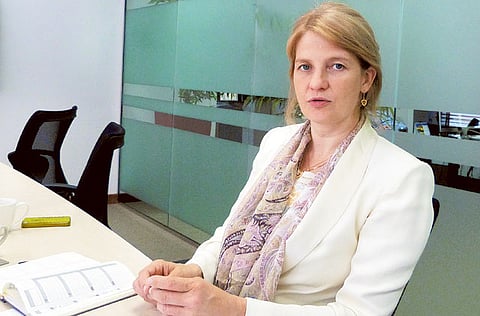Data loss prevention and protection technology is vital
DLP software helps organisations significantly minimise the overall damage and safeguard corporate sensitive data against leakage

Dubai:
Natalya Kaspersky, co-founder of the Russian antivirus software company Kaspersky Lab and CEO of InfoWatch Group of Companies, warns that insider threats are growing and organisations need to adopt data loss prevention and protection (DLP) technology.
InfoWatch was founded as a spin-off of Kaspersky Lab in 2003. In 2012 it became two different companies.
Last year, there were 934 confidential information leaks globally, registering a 16 per cent growth compared to 2011 while majority of the leaks – 89.4 per cent – involved personal data.
According to industry experts at the recently concluded security conference in Dubai, insider threats are rife at workplaces than from hackers outside as the ‘Bring Your Own Device’ (BYOD) concept is gaining momentum.
Insider threats are expected to grow 50 per cent year-on-year in the UAE as IT adoption is growing fast.
In a formal chat with Gulf News, Kaspersky, one of the successful women working in the IT security industry, said that DLP software is different from a antivirus software and help organisations significantly minimise the overall damage and safeguard corporate sensitive data against leakage.
Here are the excerpts.
Gulf News: Why do you feel DLP is important for an organisaton and how does it work?
Natalya Kaspersky: It works very easily. We put monitors on each potential channel of information packages so that it can monitor outbound network traffic and also put agents on desktop machines to monitor client activity.
We gather the information and send all the data to a central database and then there is an analytical software which analyses all the information.
We humans don’t even touch the system and does not know what is happening behind the scene. The beauty of DLP is that it not only provides data leakage protection and it is only a side-effect. It will tell an organisation which data is leaked from which terminal. We can analyse the weak points inside a company and provide the necessary solutions.
DLP technology is getting more and more important. More than 80 per cent of the companies do not know what kind of information they have. So we categorise which is important and what to protect. Different countries have different legislations. Digital data is growing at an enormous speed. The purpose of creating the company was to keep the confidential data within a company.
Gulf News: InfoWatch has been active in the Middle East. How has the response been so far?
We started here two years ago and the market was in an initial stage. Right now we are getting closer to our business. Many companies have shown interest in pilot projects. We have four big companies right now in the region and expect to have 10 companies by the end of the year. We focus on big companies because of the price factor.
Gulf News: Are organisations keen to invest in DLP rather than antivirus software?
Companies were not much bothered about the leakage of data before as it was in paper. As the data is getting digitalised, the companies are bothered now. So it is quite a difficult technological task to not let the confidential data out of the company. IT security is a big area. Government organisations led in terms of the increase in confidential information leaks last year. Hackers have an upper hand and international policing is needed to protect users.
Gulf News: With hackers getting sophisticated, do you think an organisation needs more than antivirus software to protect it?
It is true; hackers can bypass the antivirus software. The antivirus sector is totally different from the information leakage detection and prevention market though, and it’s a tough place to be. IT security is divided into two areas — infrastructure and data. Infrastructure includes servers, computers and mobile phones. For example, the Flame virus attacks a company’s infrastructure and steals the data. Any antivirus software could not detect the Flame. If DLP was present it would have notified of the data leakage.
Gulf News: Is it difficult to hack a DLP system?
Yes, it is possible to hack. DLP identities the potential threat from inside a company. It is safer to have a DLP system. For example, you can build a house without the main door but it is better to have the main door and DLP is similar to that.
Gulf News: Are there plans to push InfoWatch into newer markets?
My idea is to build a big holding company in the security arena. InfoWatch was started as a data leakage prevention company, now we also have software for social media monitoring which will analyse the social media traffic within an organisation.
We also have couple of start-ups in different areas like antivirus protection. As of now we don’t provide any malware protection. We support 13 verticals, mainly financial institutions and oil and gas sectors.
We will make bigger inroads into Europe with the acquisition of a security company in Germany. We see huge potentials in the Gulf markets.
Gulf News: What are your expectations for this year?
Our revenues grew 70 per cent last year and expect 50 per cent growth in international markets this year. My aim is to provide end-to-end solutions to a company.
Gulf News: Does InfoWatch’s DLP software support all the languages?
We support 16 languages with certain limitations. We fully support 10 languages, including Arabic.


